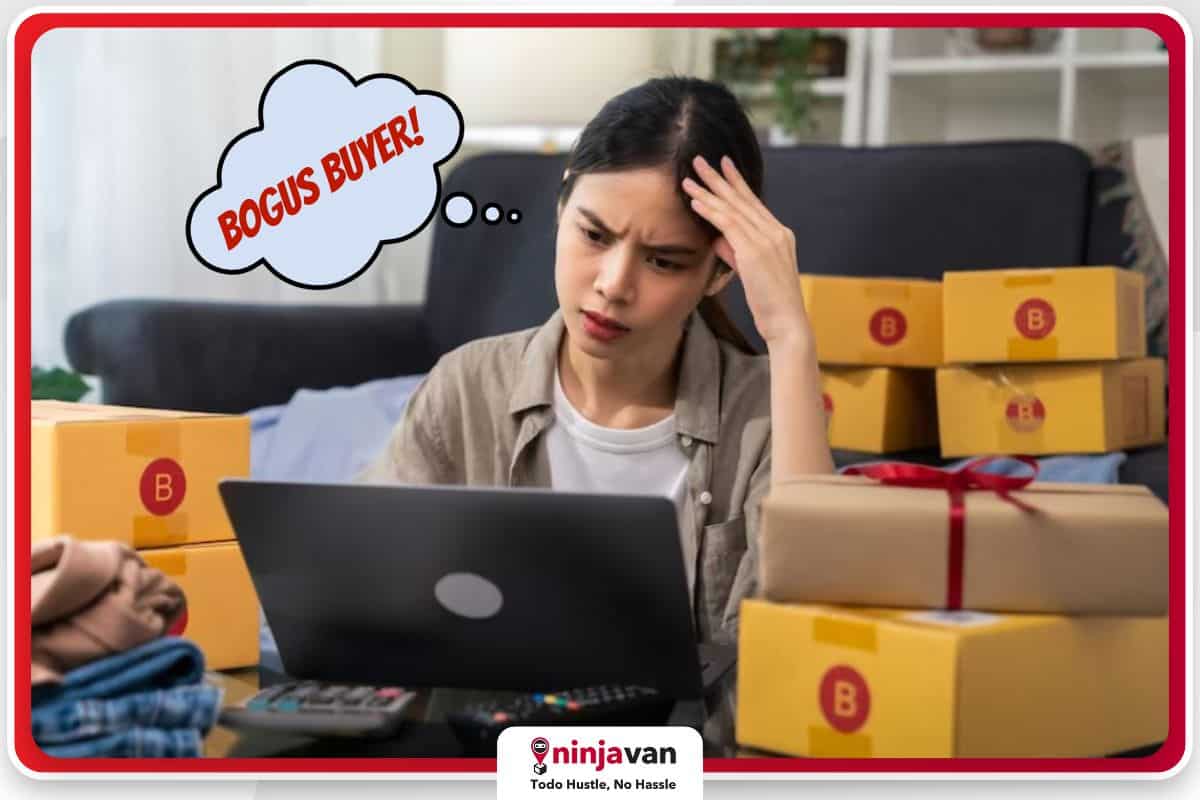Sellers face both opportunities and risks when utilizing digital platforms — marketplaces or ecommerce websites — to sell their products. One of those risks is dealing with bogus buyers.
Bogus buyers or people who make fraudulent purchases are still rampant in the Philippines, and it has been one of the many problems online businesses are facing.
What is a bogus buyer
Bogus buyers scam sellers by using fake identities. They will place orders online but, in the end, won’t buy them. Sometimes they use fake accounts and give the wrong address. In most cases, the mode of payment is cash-on-delivery (COD).
Another form of bogus buying is when the customers pretend that their orders were never delivered or were damaged or incomplete, and will attempt to get their money back from the sellers.
What these fake buyers don’t realize is that the sellers put in a lot of work in fulfilling an order — checking the inventory, packing the item and sending the parcel to the courier.
Not to mention that the seller is expecting to make a sale. Fake transactions not only waste their time but also affect their cash flow.
Also read: Be Smart and Take These Steps to Avoid COD Scams
How to spot a bogus buyer
Identifying a bogus buyer might be difficult and time-consuming, but as a seller, you’ll have to deal with them to protect your business. The sooner you prevent scams from happening, the better.

cancel them at the last minute.
Here are some ways you can spot a bogus buyer:
Suspicious account
Bogus buyers use dummy accounts and fake information when interacting with sellers so that their identities remain hidden. If the buyer’s profile is incomplete or lacks important details, it could be a sign that the buyer is not serious or may be a scammer.
Doesn’t accept payment first policy
Scammers often don’t accept having to pay for their orders first before delivery, and insist aggressively on COD or any other payment options aside from what you’re offering.
Inconsistent replies
When the seller asks for further details, they give inconsistent replies and endless excuses. Sometimes they even respond late or bombard you with nonstop messages. If you think the customer is not being honest with you, you may be dealing with a scammer.
Better be safe and not push through with the transaction.
Asking unnecessary questions
Bogus buyers bombard you with unnecessary and unreasonable questions to make it sound like they’re interested in your products. While real buyers may ask a lot of questions, too, the difference is that you can tell when they’re sincere and merely seeking assurance from you.
Frequent changes to the order
Scammers are most likely to make indecisive decisions and have requests that are beyond the seller’s capacity or are inconvenient for the seller.
6 ways to avoid bogus buyers
Unfortunately scammers have become increasingly creative in their methods to deceive and defraud sellers. As such, it’s important to exercise caution and be vigilant when dealing with buyers who show suspicious behavior.

1. Verify their profile
Verify the buyer’s profile to ensure authenticity of their identity. Is the information complete? Is the profile image clear and looks real? Is the name provided sound like the name of a real person?
If you sense that the profile is sketchy, ask for additional information, such as their full name, delivery address and phone number. You can also check the transaction history of that account.
2. Require complete information
Require the customers to provide complete information before they can order from you. Complete information doesn’t just mean the usual name, address and phone number. You can also require an email address and secondary contact details in case the first number is unreachable.
Verify their orders by asking confirmation via email or SMS. Be wary of bouncing email addresses and unresponsive contact numbers. If you encounter this, better not push through with the transaction.
3. Payment first policy
Asking for payment first before processing and shipping orders is always an effective way to stop bogus buyers. You can also allow reservations for a few days to give customers time to make the payment.
However, this may also turn off other buyers who prefer COD. One way to address this is to set a cap amount for COD transactions.
#NinjaTip: Speaking of COD, save on your shipping costs with Ninja Van’s COD fees for as low as 1.5%. Sign up for a VIP shipper account to claim this special rate.
4. Protect your personal information
Some bogus customers are too friendly to gain the trust of the sellers and get sensitive information about the business. Never share your personal and financial information for your security.
The best way to do this is to never make transactions outside of the online selling platform or your ecommerce site. Some bogus buyers would try to get your contact details and say they want to buy your products in bulk. But really, they’re just trying to scam you.
Be on the safe side and keep all your transactions within your selling platform.
5. Implement a return policy
Create a clear returns protocol to avoid scams. Some sellers ask customers to make unboxing videos in case the parcels were delivered with damaged or missing items. They require a no video no returns/refund policy.
You can also ask for photos of the products or other details. Some sellers, meanwhile, set protocols on who will shoulder the shipping expenses when returning the items. Whichever you decide, make sure your returns policy is highlighted and posted on your website or online shop.
Here’s how you can Write an Easy Return and Refund Policy.
#NinjaTip: RTS is, unfortunately, part of online selling. As a Ninja Van VIP shipper, you’ll enjoy free RTS, plus up to three (3) delivery attempts on your parcels. Sign up now to enjoy No RTS Fees for life!
6. Engage with your customers
As an online seller, you will earn the skill to determine if you’re talking to a genuine or bogus buyer when you take the time to engage with your customers. Get to know your target market and understand their needs or the usual inquiries they have about your products.
By doing this, you can identify a suspicious buyer from your regular customers. If you’re unsure whether you’re dealing with a serious buyer or not, counter-check using the tips we’ve provided here.
Bogus buyer laws in the Philippines
It’s a norm in the Philippines to expose bogus buyers by posting their full identity publicly. While we understand where the sellers are coming from, it’s also good to know that there are laws that can protect you from fraudulent buyers.
According to the DTI, online sellers should keep a record of phone numbers, calls or messages, and report the fake buyers to authorities. They can be charged with estafa under the Revised Penal Code.
Article 315 of the Revised Penal Code cites that “estafa or swindling is committed with unfaithfulness or abuse of confidence, by means of false pretenses or fraudulent acts, and through fraudulent means (including imaginary transactions). Violators may get a maximum jail time of up to 20 years depending on the amount of fraudulent transaction involved.”
Likewise, the Consumer Act (Republic Act No. 7394) cites that bogus buyers who engage in fraudulent activities may face fines and imprisonment.
Protect your online business from bogus buyers
We’re sure most online shoppers are legit, but there are those who take pleasure in defrauding sellers.

There are many kinds of frauds that can happen in ecommerce, and while customers are wary of who they do business with, online sellers should also protect their business from bad buyers.
So, watch out for bogus buyers and keep your cash flow healthy by following our tips above.
More tips to protect your online business:
Protect Your Ecommerce Site from Online Threats
How to Avoid TikTok Shadowban






